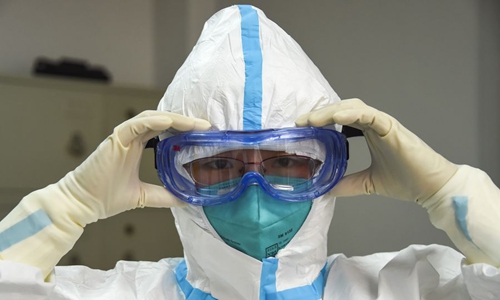CDC chief urges bigger role for disease prevention and control system
By Leng Shumei Source:Global Times Published: 2020/5/28 21:23:40

Cao Ting adjusts her goggles before entering the laboratory of Xiaogan's center for disease control and prevention in central China's Hubei Province, Feb. 14, 2020. (Xinhua/Hu Huhu)
A political adviser, who is also the chief of the Chinese Center for Disease Control and Prevention (CDC), has called for giving a bigger say and scientific authority to the disease prevention and control system to address problems exposed in the COVID-19 pandemic.
"The pandemic has revealed loopholes in China's major epidemic prevention and control mechanism and its public health system," Gao Fu, head of the CDC and member of the National Committee of the Chinese People's Political Consultative Conference (CPPCC), told media.
He called for reform of the system, noting that disease prevention and control institutes failed to fully exert effects in early warning and monitoring, epidemiological surveys and launching prevention measures during the COVID-19 outbreak.
Gao is not the only expert who called for a more powerful disease prevention and control system in the wake of the epidemic.
Renowned respiratory disease expert Zhong Nanshan previously told media that the pandemic revealed an "overly low status" of disease prevention and control institutes in China, and he called for some level of executive power for these institutes.
Echoing Zhong's suggestion, Gao stressed that the goal of the reform is not to empower the system but to prevent administrative interference and safeguard the system's scientific independence and authority.
The epidemic showed that the current system lacks decision-making power, has only loose cooperation among CDCs at different levels, and features an ineffective coordination mechanism between CDCs and other medical-related departments, Gao noted.
According to Gao, the number of working staff in disease prevention and control institutes at different levels declined by 4 percent from 2010 to 2018 and the number of certified doctors in the institutes declined by 11 percent during the same period.
He suggested enhanced vertical leadership in the China's CDC system, as well as direct reports to government officials about key public health events and the power to release epidemic information to the public upon official authorization.
Wang Hongwei, a professor at Renmin University's School of Public Administration and Policy, told the Global Times that he thought the direct report system Gao suggested could reduce the unnecessary interference of administrative departments at different levels and effectively facilitate the reporting procedures.
Wang warned that public health issues are complicated and require the participation of different departments, so the CDC institutes could not be fully independent.
Gao also suggested enhancing infrastructure construction, including P4 labs for the national CDC and having at least one P3 lab in each province.
As a CPPCC member, Gao proposed to establish infectious disease monitoring centers, infectious disease sample databases and restart research on SARS, media reported.
Newspaper headline: Adviser urges bigger role for CDC system
Posted in: SOCIETY,DEPUTY AND MEMBER